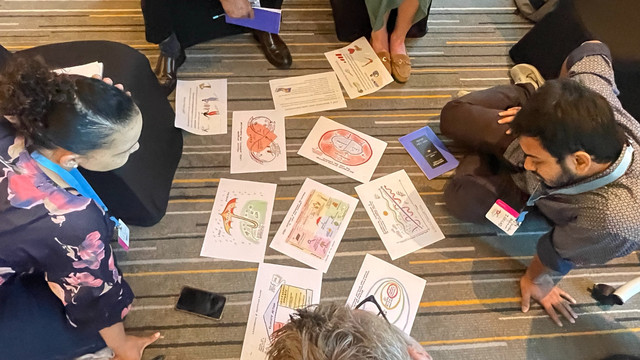Winning entry of 'My Story' competition says extreme weather affects Mexican festivals
The winner of a competition to write a blog on how dealing with the impacts of climate change affects everyday life highlights how rainfall hampers the celebration of Mexican festivals.

Dancing at the Dia de Los Muertos festival, which incessant rainfall spoiled in Mexico this year (Photo: Copyright Richard Cawood)
I like eating food in season because it reconnects me with nature's cycles and the passing of time. I enjoy, for example, waiting to have mangoes in May and tangerine juice in winter. But not only fruits and vegetables, it also goes for festive meals.For example, I only eat chiles en nogada in September and Pan de Muerto during the first week of November.
As much as I like eating in season, I like to celebrate Mexican traditions. And this year I noticed that climate change is impacting our Mexican traditions. How? Rain-changing matters are making us modify our celebrations.
To name a few changes, I will describe my 2014 celebrations:
April
Holy Week is one of the most widely celebrated and important religious observances in Mexico. Almost all towns and cities in the country have some kind of public observance during a two-week period that starts from Palm Sunday and runs at least to Easter Sunday. Most of the observances include processions. Where? In the streets! And this year it was raining. So instead of processions, we had the prayers indoors.
May
We do not have traditional celebrations during this month but high levels of spirituality because normally you would pray for a little bit of rain because it is too hot and you don't get any breeze at all. Some sayings and songs even talk about how tough it is to work during this month.
This year, there was no need for praying because it was raining. And heavy rainfall. On one hand, I was happy; but on the other, rain at this time of the year translates into no cinema at the park, no drinking at roof terraces, no ballet at the lake, and some outdoor concerts being cancelled.
September
Each year on the night of the 15th at around eleven in the evening, the President of Mexico rings the bell of the National Palace in Mexico City. After the ringing of the bell and shouts of patriotism from the balcony, the celebration is followed by mass singing of the national anthem and a show of fireworks.
A similar celebration occurs in cities and towns all over Mexico, and in Mexican embassies and consulates worldwide. I normally go out to the main square with my family in Veracruz, a city in the east coast. This year, we followed the celebration by tuning the TV sitting in the living room of my grandfather's house because of a storm and we decided – like many others – to be cautious.
November
Day of the dead. The holiday focuses on gatherings of family and friends to pray for and remember friends and family members who have died. Traditions connected with the holiday include building altars, honoring the deceased using flowers and the favourite foods of the departed, and visiting graves with these as gifts.
And guess what. It was raining. My family has always preferred to build the altar in our home so our tradition didn't change. But I thought about the families from other towns such as Pátzcuaro and Janitzio where people spend all night beside the graves of their relatives. I don't know if they did it with such a bad weather.
December
Posadas, our Christmas parties. I really hope it won't rain because if it does I cannot imagine how we will do it indoors. In my house there is no space to break the piñata.
On average, the world is already getting more precipitation now than it did 100 years ago: nearly two per cent more worldwide and the effects vary by region.
I am truly concerned about the change of the rain patterns and not only about the impact on our traditions, also the impact on the agriculture, water supplies and energy generation.
All these little changes make me wonder if our society is not suffering of change blindness. And like the parabole of the boiling frog, we are terrible at assessing slow, gradual changes, even when they threaten our survival.
Why we will have to wait for big impacts to say these small changes are the effects of climate change? I believe big changes are made of small changes every day.
Carmen Carmona, of Mexico, is the winner of the 'My Story' competition run by the Climate and Development Knowledge Network (CDKN) as part of the 12th Development & Climate Days event. Organisers invited entrants to describe "How is climate change affecting your family, your life, your work? Tell us your story of dealing with the impacts of climate change in your everyday life," and this winning entry was originally posted here.



